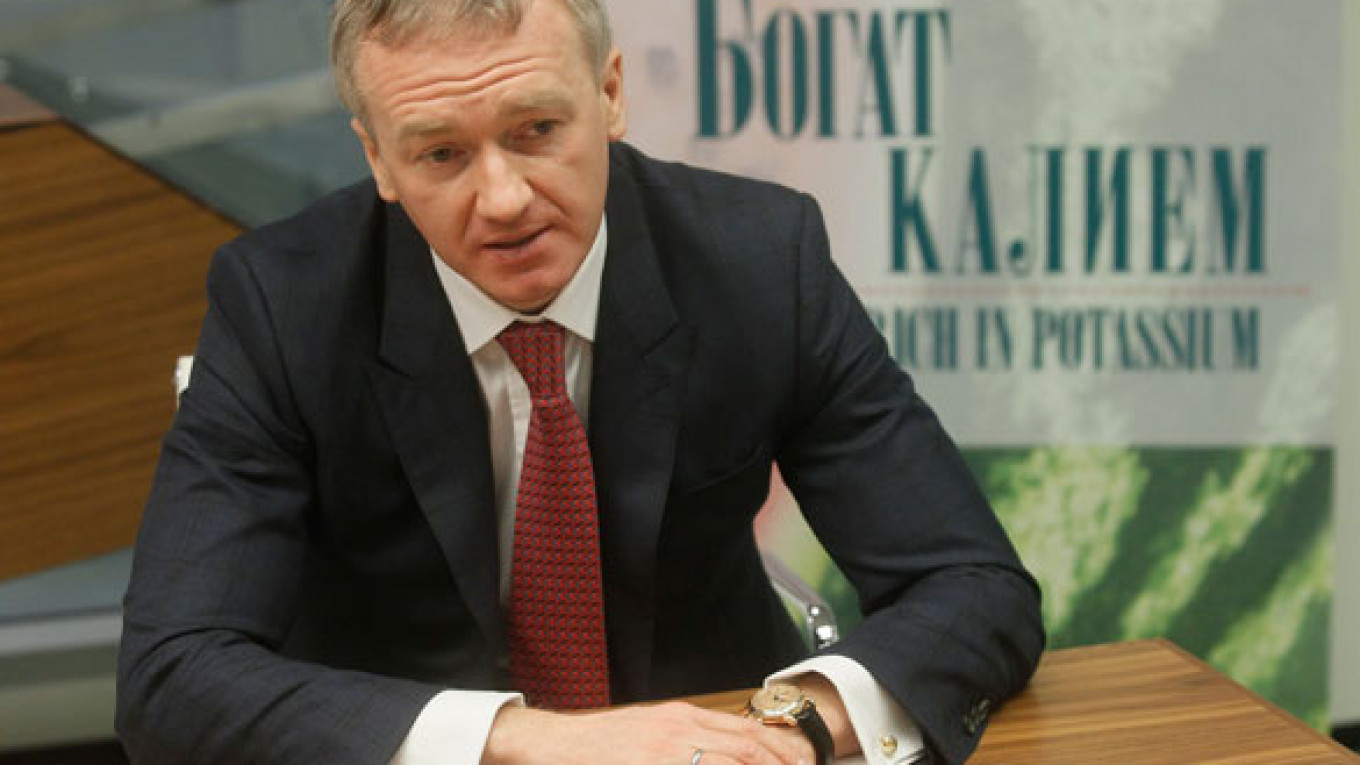The head of Russia's largest potash producer Uralkali has been detained in Belarus, a news report said Monday, exacerbating tensions between the two ex-Soviet neighbors after the dramatic collapse of a sales joint venture last month.
Vladislav Baumgertner was held by the Belarussian Investigative Committee on suspicion of abusing his position and official powers, RIA Novosti reported.
Four other top-executives at Uralkali were put on the international wanted list.
If convicted, Baumgertner could face up to 10 years in prison under Belarussian law, media reports said.
In July, Uralkali abruptly pulled out of Belarus Potash Company, or BPC, which managed sales of potash, a key ingredient in fertilizer, for both Belaruskali and Uralkali, following repeated claims by the Russian company that its Belarussian partner was violating the agreement to sell exclusively through BPC.
The decision caused the Uralkali's share price to collapse — knocking 20 percent of capitalization — and raised the prospect of aggressive competition in a market where a few suppliers have long maintained a cartel-like grip on prices.
According to Reuters, before the break-up BPC, along with Canada’s Canpotex, controlled 70 percent of global potash trade.
Some industry analysts at the time called the situation a revolution on the potash market.
Potash is a key foreign-currency earner for Belarus, meaning that cheaper prices could seriously undermine the value of the country's currency.
“The information at the prosecution's disposal sheds light on the hostile plans the management of Uralkali had for Israeli, German and Canadian potash producers,” the Belarus Investigative Committee told Belarussian media, Itar-Tass reported.
The company's management and its shareholders, among them Suleiman Kerimov, planned to engineer a massive drop in the potash price back in 2011 to gain maximum gain for themselves, committee spokesman Pavel Traulko said.
Alexander Babinsky, a spokesperson for Uralkali, said the company is “outraged by the detention and consider[s] it a provocative action on the Belorussian part,” Itar-Tass reported.
Baumgertner was detained while trying to depart from Minsk airport after a meeting with Belarus Prime Minister Mikhail Myasnikovich, who had invited him to come, Babinsky said.
“[These] actions could be an attempt to put pressure directly on Baumgertner and indirectly on Uralkali, but it is not likely that they will be able to force the company to change its plans,” said Dmitri Baranov, a senior analytic at Finam.
“Chances are, the situation will resolve very soon, as the company and top Russian officials have enough muscle to influence decisions in Belarus,” he added.
The reaction of the Russian government came soon after the first news of Baumgertner's detention surfaced.
Deputy Prime Minister Igor Shuvalov called the conflict absurd, adding that the government had no connection to the breakup of the joint trade channel and the scandal that followed.
“We think it is a strange situation, especially considering the nature of our relations,” Shuvalov said, Itar-Tass reported. “We need to quickly resolve these difficulties and agree on a decent relationship or on a civilized divorce.”
Belarus, led by President Alexander Lukashenko has, barring occasional tifs, long been a Russian ally.
The conflict could have a short-term negative effect on the price of Uralkali shares, said Andrei Shenk, an analytic at Investcafe.
“However, if the situation is resolved quickly, the negative effect will soon fade,” he said.
Uralkali shares dropped slightly Monday, ending the day down by a little more than 3 percent.
Contact the author at [email protected]
A Message from The Moscow Times:
Dear readers,
We are facing unprecedented challenges. Russia's Prosecutor General's Office has designated The Moscow Times as an "undesirable" organization, criminalizing our work and putting our staff at risk of prosecution. This follows our earlier unjust labeling as a "foreign agent."
These actions are direct attempts to silence independent journalism in Russia. The authorities claim our work "discredits the decisions of the Russian leadership." We see things differently: we strive to provide accurate, unbiased reporting on Russia.
We, the journalists of The Moscow Times, refuse to be silenced. But to continue our work, we need your help.
Your support, no matter how small, makes a world of difference. If you can, please support us monthly starting from just $2. It's quick to set up, and every contribution makes a significant impact.
By supporting The Moscow Times, you're defending open, independent journalism in the face of repression. Thank you for standing with us.
Remind me later.






